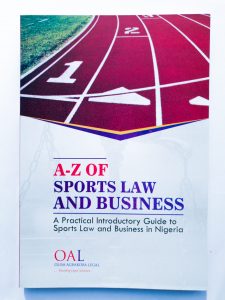
Fifa’s Football Agent Regulations 2022 – AN APPRAISAL | Oluwajoba Odefemi[1]
On December 16, 2022, one day before Croatia played Morocco in the third-place playoffs at the 2022 FIFA World Cup in Qatar, and two days before Argentina beat France in that epic final to win the competition, the Fédération Internationale de Football Association (FIFA) Council at its meeting in Doha ratified a new regulation regime to govern the activities of football agents, called the FIFA Football Agent Regulations (“FFAR/the Regulations”)
On January 9, 2023, the Regulations – which FIFA says will guarantee minimum professional and ethical standards for the occupation of football agent, including a mandatory licensing system – came into force. The new regime replaced the erstwhile FIFA Regulations on Working with Intermediaries (“the Intermediary Regulations”), which came into force on 1 April 2015, and which had previously de-centralised the regulation of such intermediaries.
While the FFAR may not be all good news for some of the existing persons who serve as football agents given some of the restrictions it has introduced, it is one of the more anticipated developments by football stakeholders in the last few years in view of its potential to bring more professionalism to football agency, as well as ensure organisation in an otherwise chaotic sector of the football world.
Among the core objectives of FIFA’s introduction of the new football agency regime are to ensure the quality of the service provided by football agents to clientsare fair and reasonable, limiting conflicts of interest,protecting players who lack experience or information relating to thefootball transfer system and preventing exploitative and excessive practices.[2]
The Regulations govern the occupation of football agents involved in theinternational transfer system, and particularly apply to representation agreements with an international dimension or connected to an international transfer or transaction.[3]Thus, for example, where there is a transfer of football players between a football club in Nigeria’s Professional Football League (first tier) and another football club in Nigeria’s Nationwide League One (third tier), the football agents involved in that transaction will not be governed by the Regulations. Each member association is required to implement and enforce its own national football agentregulations (which must be consistent with the FFAR) by 30 September 2023, which will govern the occupation of footballagents within their respective territory.[4]
Under the new regulations, to engage in the business of football agent services, prospective football agents will need a football agent licence issued by FIFA.To be issued a football agent licence, an applicant mustsuccessfully pass the exam conducted by FIFA, comply with the eligibility requirements and pay an annual licence fee to FIFA.[5]
It is worthy to note that a football agent licence can only be issued to a natural person, is strictly personal and non-transferable and authorizes agents to provide services to football players, coaches and clubs on a worldwide basis.[6] Licensed football agents are required to comply with continuing professional development requirements on an annual basis.[7]
Given the above, football players who are currently represented by family members (think Lionel Messi, Neymar, et al) who have no special qualifications to operate as FIFA licensed agents will be required to comply with the provisions of the FFAR.
Furthermore, a football agent may only perform football agent services for a client after entering into a written Representation Agreement with that client, and the maximum term for any such agreement with an individual is two (2) years[8].
However, Representation Agreements between football players/clubs and agents in existence prior to December 16, 2022, although not compliant with the requirements of the FFAR, will remain valid until their natural expiration date as is currently contained in the contract.
Also, agents registered before 2015 (under FIFA’s oldlicensing regimesof 1991, 1995, 2001 or 2008) will not have to take the new exam as they qualified under the old rules.[9]
Multiple representation by a single agent to different parties in a single transaction has been limited. This ensures that conflict of interest is avoided. Thus, under the new football agent regime, a football agent can no longer perform football agent services for all parties within the same transaction, both a releasing entity and individual in a transaction, or both a releasing entity (selling club) and engaging entity (buying club)in a transaction. The only permitted exception for dual representation is represent both an individual and an engaging entity in the same transaction, and this is subject to prior explicit writtenconsent being given by both clients.[10]
Another innovation of the FFAR is the enforcement of a cap on the amount chargeable by agents as service fee. Under the Intermediary Regulations, the cap was merely a recommendation. [11]Agents representing individuals or an engaging entity can now charge a maximum of 3% of the individual’s remuneration where the individual’s annual remuneration is above USD200,000 (Two Hundred Thousand United States Dollars).
Where an agent represents both an individual and the engaging entity in a single transaction (as apermitted dual representation), the maximum service fee chargeable is 6% of the individual’s remuneration where the individual’s annual remuneration is above USD200,000 (Two Hundred Thousand United States Dollars).However, where an agent represents the releasing entity, the maximum service fee chargeable on an annual remuneration above USD200,000 (Two Hundred Thousand United States Dollars) is 10% of the remuneration.[12]It is worthy to note that if an individual’s remuneration is above USD200,000, the 3% and 6% limits only apply to the amount in excess of USD200,000.
The aim of the cap on agent fees seems to be to arrest the excesses of a few agentswho are wont to exploiting their clients’ moves from club to club to maximize their gains (Man United fans will be familiar with the reported earnings of late football agent Mini Raiola on transactions involving Paul Pogba). The question remains whether such blanket cap is not unfair and limiting on the freedom of service professionals to charge in line with their level of expertise.
Agents are also barred from approaching clients in solicitation where such client is bound by an exclusive RepresentationAgreement with another football agent, except in the final two monthsof that exclusive Representation Agreement, and may not enter into a RepresentationAgreement with such client except in the final two months of that exclusive RepresentationAgreement.[13]
Finally, the Regulations aim to protect minors by stipulating that football agents may not approach minors or their legal guardians earlier than six months before they become eligible to sign their first professional contract, and any approach made within the six months window must be made only afterwritten consent has been obtained from the minor’s legal guardian.[14] For example, in territories where football players are allowed to sign their first professional contract at 17, no approach must be made or Representation Agreement signed before a football player is 16 ½ years, while for territories where the qualifying age is 18, such approach must not come before a player is 17 ½ years.
The FFAR came into force on Monday, 9 January 2023, although there is provision for a transition period ahead of the obligation to only use licensed football agents and the cap on agent fees, which begins on 1 October 2023.
FIFA aims to ensure compliance with the requirement of the FFAR by requiring that all relevant transfer or employment agreement in a transaction contain the football agent’s name, their client, their FIFA licence number and theirsignature. Nonetheless, transactions may still be negotiated and concluded without the services of an agent at all, in which case, this is to be explicitly stated in the relevanttransfer or employment agreement.[15]
All in all, the new regime should bring greater control to the activities of football agents and ensure that rogue agents find it difficult to exploit clients, particularly football players who have little leverage in negotiations.
[1]Oluwajoba is a Legal Practitioner based in Lagos,with specialization in Corporate Commercial Law, Regulations and Compliance. He is also a licensed Football Referee and Sports Law enthusiast.
[2]Article 1 (2), FFAR
[3]Article 2 (1), FFAR
[4]Article 3 (1), FFAR
[5]Article 4 and 5, FFAR
[6]Article 8, FFAR
[7]Article 9, FFAR
[8]Article 12 (3), FFAR
[9]Article 23, FFAR
[10]Article 12 (8& 9), FFAR
[11]Article 7 (3), Intermediary Regulations
[12]Article 15, FFAR
[13]Article 16 (1), FFAR
[14]Article 13, FFAR
[15]Article 12 (11 & 12), FFAR


